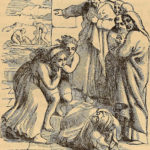We run our website the way we wished the whole internet worked: we provide high quality original content with no ads. We are funded solely by your direct support. Please consider supporting this project.

How is the Bible “God-Breathed”?
The historic-orthodox church has always confessed that all canonical writings are “God-breathed” (1 Tim 3:16). But what exactly does this mean? How could God guarantee that the writings that his “breathing” produces are precisely what he intended without thereby undermining the autonomy of the agents he “breathes” through? In other words, did God breathe the Scriptures by unilaterally causing the authors to write what they wrote?
If God “breathed” all Scripture in the process of “breathing” Jesus, and if everything Jesus was about is thematically anchored in the cross, as I’ve argued in yesterday’s post, then I submit our understanding of the nature of “God-breathed” Scripture also be anchored in the cross. The question we must consider, therefore, is how God’s “breathing” on Calvary might inform our understanding of his “breathing” in Scripture?
The most important aspect of God’s communicative action on Calvary, I believe, is this: On Calvary, God revealed himself not just by acting toward humans, but by allowing himself to be acted on by humans as well as the fallen Powers. God certainly took the initiative in devising the plan of salvation that included the Son of God becoming human at “the right time” for him to get crucified. And God was certainly taking the initiative as Jesus taught and acted in provocative ways that were certain to get him crucified. Hence, Scripture says that part of God’s “deliberate plan and foreknowledge” was to have Jesus handed over (Ac 2:23) to wicked people to do what God’s “power and will had decided beforehand” (Ac 4:28).
At the same time, as active as God was in “breathing” his communicative action on Calvary, we must also notice that this revelatory act took place by God allowing wicked humans and forces of evil to act out their wicked and violent intentions against Jesus. Indeed, the physical and verbal assaults Jesus absorbed in the process of being crucified were actually just a microcosm of the sin of the world that Jesus absorbed on the cross, thereby allowing every human throughout history to act on him. It is within this dialectic of acting and being acted upon that God communicates his true identity, and given that his true identity is humble, self-sacrificial love, it’s hard to see how it could have been otherwise. A deity whose essence was power could reveal himself by unilaterally acting upon others, but not the one true triune God whose eternal existence is an unending act of three divine Persons giving themselves wholly over to one another.
The cross is thus the full revelation of God’s character precisely because it wasn’t a unilateral action of God toward humans but rather came about, in part, by God humbly allowing human and angelic agents to engage in hostile activity against God. For this same reason, this paradigmatic communicative act was not merely a revelation of God’s power but also of God’s wisdom, as God wisely turned the evil he absorbed for good, including the good of glorifying his Father by revealing his true self-sacrificial character as well as the good of defeating the powers of evil and the good of freeing humans from their oppression to sin and the devil.
Now, given that the paradigmatic act of self-revealing “breathing” on Calvary is the ultimate telos of all divine “breathing,” and given that this act involved agents being allowed to act on God as well as God acting on agents, how can we not assume that this holds true for all of God’s acts of self-revealing “breathing”? If we accept this, it fundamentally transforms our understanding of the “God-breathed” nature of Scripture. Among other things, it means that our confession that Scripture is divinely inspired should not be understood as suggesting that all that is written within the canon is the result of God unilaterally acting through human authors. Reflecting God’s cruciform character, these writings also reflect God humbly permitting the culturally-conditioned and sin-tainted worldviews of biblical authors to act upon him.
Moreover, as is true of God’s revelation on Calvary, this means that Scripture’s inspiration must be understood not only as a reflection of God’s power but also as a reflection of God’s wisdom. As with the cross, we must expect to see God wisely achieving his good communicative ends by utilizing the various ways he has allowed the limited and fallen worldviews of Scripture’s human authors to act upon him and to thereby condition the form his communication in Scripture takes.
Image by Snutschi via Flickr.
Category: General
Tags: Bible, Bible Interpretation, Cross, Cruciform Theology, Inspiration, Jesus
Topics: Biblical Interpretation
Related Reading

Conflicting Pictures of God
In my ongoing reflections on the ReKnew Manifesto, I’ve spent the last two posts (here and here) arguing that nothing is more important in our life than our mental images of God. If so, then the all-important question is: what authority do we trust to tell us what God is like? To most evangelicals, the…

Podcast: Why Did Jesus Need to Be Baptized?
Greg submerges himself in the topic of Jesus’ baptism. http://traffic.libsyn.com/askgregboyd/Episode_0078.mp3

Religion that Blinds Us to God
For a variety of reasons, many Jews at the time of Jesus had come to believe that heaven had been closed since the writing of the last book of the Old Testament. God was distant and no longer active among his people. Their religion focused on holding fast to the law God had given in…

Podcast: If Sin has Its Own Consequences, What Does God Actually Forgive?
Greg talks forgiveness, reconciliation, consequences of sin, and the afterlife. All in less than 5 minutes. http://traffic.libsyn.com/askgregboyd/Episode_0346.mp3

Who Killed Ananias and Sapphira? A Response to Paul Copan (#6)
In his critique of Crucifixion of the Warrior God (CWG), Paul Copan makes a concerted effort to argue that the God revealed in Jesus Christ and witnessed to throughout the NT is not altogether non-violent. One of the passages Copan cites against me is the famous account of Ananias and Sapphira falling down dead immediately…

The Distinctive Mark of Jesus Followers
Jesus’ teaching to love our enemies was understandably shocking to his original audience—just as it is to us today. Jesus expected much, which is why, after telling his audience to love their enemies he added that if we only love those who love us and do good those who do good to us, we’re doing…
